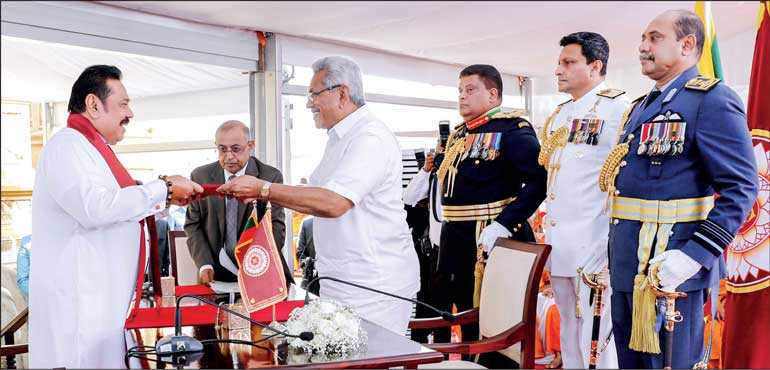Wednesday Feb 18, 2026
Wednesday Feb 18, 2026
Friday, 14 August 2020 00:01 - - {{hitsCtrl.values.hits}}

Undoubtedly, the Government has acquired enormous power. The enormity of power alone will not be a solution to the crisis Sri Lanka is facing. The crisis can only be overcome if there is a greater creative wisdom that transcends the magnitude of power - Pic by Jayamal Chandrasiri
The victory of the Government at the Parliamentary Election is huge and miraculous. Had there been a First-Past-The-Post (FPTP) electoral system that was in operation prior to 1977 instead of the current system of Proportional  Representation, the result achieved by the Pohottuwa (Sri Lanka Podujana Peramuna – SLPP) could have been much greater than the result achieved by the United National Party (UNP) in 1977.
Representation, the result achieved by the Pohottuwa (Sri Lanka Podujana Peramuna – SLPP) could have been much greater than the result achieved by the United National Party (UNP) in 1977.
The landslide victory of the UNP at the ’77 election resulted in weakening the Opposition movements in the Sinhala south to a maximum and creating a single party hegemony. The political outcome of the result of the recent election is more or less similar to that of the ‘77 election.
The repressive economic policy followed by the People’s Front Government which was in power prior to 1977 and the divisions between the Sri Lanka Freedom Party, the SLFP and the Leftist Parties which constituted the People’s Front Government have had a significant impact on the victory of the 1977 Parliamentary Election by the UNP. Similarly, the current split of the UNP was an important factor that has led to the enormity of the victory of Pohottuwa this time.
The massive victory of the UNP in 1977 changed the overall trajectory of the country, for better or for worse. It changed the parliamentary system of governance; created a presidential system in which all the powers of the State were concentrated in the President. Plundering of public property was made a regular feature of State administration. The economy was opened up. Despite the rapid economic development, Sri Lanka was turned into a country of incessant bloodshed on a large scale.
In the opinion of President J.R. Jayewardene, the only thing the Executive President could not do was to make a man a woman or a woman a man. The circumstances were such that he was made to spend the latter part of his life amidst death threats. The JVP insurgents demanded his head publicly. Neither the JVP nor the LTTE were able to assassinate him, but he was unfortunate to witness several of his best loyalists and close confidants being assassinated when he was alive.
The chapter opened by JR persisted unchanged to the present as an incessant stream. In the end, the country was left with a land which has been reduced to a hapless chew having its essence been extracted mercilessly to a maximum. What is the present Government which has got an almost similar power going to do now? Will it make Sri Lanka which has been rendered miserable, a paradise? Or will it make it a hell?
The role of the UNP
The Yahapalana Government can be described as a political anomaly that eventually pushed the country into a state of extremism. If the two leaders of the UNP, Ranil Wickremesinghe and Sajith Premadasa, had managed to maintain the unity of the party subsequent to the defeat at the last Presidential Election, though it was not possible to prevent the Pohottuwa winning the election, at least its victory would not have been so huge.
A closer look at the division of the UNP would reveal that there were no serious or concrete reasons for the split. In fact, it appears to have occurred because of the arrogance of the two leaders and the stupidity of their main supporters. Obviously Ranil did not make a serious attempt to defuse the tension that arose on the issue of the party leadership and prevent a rift in the party while safeguarding his authority in it. In fact it seems that he wanted to see a rift in the party in view of the attitude of Sajith that he will not have a future as long as Ranil retains his dominance in the party.
This explains the extent of internal democracy operative in the party system in our country. The end result of this split has been the demise of the UNP as a political entity together with the political career of Ranil Wickremesinghe, and Sajith becoming a leader who had lost the strength of the UNP to a large extent.
JVP and the other parties
The decline of the JVP too deserves closer scrutiny. The JVP is a movement that, after a massive and horrific armed struggle, has re-entered the democratic path effectively. Yet it could be described as a political movement which has failed to mobilise itself on a new path creatively. It had to deal with a distorted and corrupt political system.
But the JVP did not assert itself strongly for pragmatic reforms to bring about a positive change in the system except for contemplating shortcuts to seize power under the existing system. As a result, instead of becoming an effective alternative, it too has fallen victim of the cruel system itself.
The TNA also has suffered a great deal due to its close involvement in the Yahapalana Government. In its attempt to support the program of the Yahapalana regime, the TNA refrained from playing a strong role in solving the burning issues of Tamil people. It seems that TNA has to pay a huge price for that.
The dilemma of the Opposition
The Samagi Jana Balavegaya, the party led by Sajith, stands as the main force among the Opposition parties even though it has not been able to acquire a strong position. Yet, does Sajith possess a strong vision and courage to bring all Opposition movements together under one banner?
J.R. Jayewardene, Mahinda Rajapaksa and Chandrika Kumaratunga can be considered as courageous leaders who had acted bravely in spite of various limitations and when all the odds were against them. The Satyagraha movement of Attanagalla, launched by J.R. Jayewardene in 1976, the Pada Yathra and Jana Goshawa campaign spearheaded by Mahinda Rajapaksa in 1992, and unearthing of the gruesome mass grave at Suriya Kanda by Chandrika in 1994 can be considered as major instances in which the respective leaders have displayed their bravery. But, Sajith is not a leader who has exhibited yet a feat of such bravery.
The minorities are the most distressed among the people of Sri Lanka. A significant share of votes polled for the Samagi Jana Balavegaya of Sajith consists of the votes of Muslims and Up-Country Tamils. Under the circumstances, if Sajith fails to pursue a balance policy that strongly safeguards the interests of the minority communities in a manner that would not undermine the confidence of the majority Sinhala community, certainly it might result in a major depletion in the support base of the Samagi Jana Balavegaya.
Only a strong leader who possesses the self-confidence to speak out strongly against repressive actions of the Government and the ability to gather together all Opposition movements under one flag and provide a practical solution to the crisis facing Sri Lanka can create a strong Opposition movement against the ruling party.
The dilemma of the Government
Undoubtedly, the Government has acquired enormous power. The enormity of power alone will not be a solution to the crisis Sri Lanka is facing. The crisis can only be overcome if there is a greater creative wisdom that transcends the magnitude of power.
The entire socio-economic and political system is in disarray. So much so, the Government is confronted with a situation in which it finds it difficult to pay at least the salaries and pensions of public servants. At the same time, $ 3 billion has to be paid this year for the foreign debts obtained. Apparently one solution available would be to sell the country’s valuable and scarce resources to foreign powers on a large scale. But it is not a viable solution but an aggravation of the problem.
Does the Government have an alternative solution for that? If so, what is it? The Government should explain it to the country. If the Government has a solution for the crisis, which is sound and practical, then it should be supported by everyone to implement it irrespective of differences and without undue obstructions.